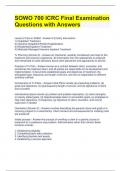SOWO 700 ICRC Final Examination
Questions with Answers
Levels of Care in ASAM - Answer-0.5) Early Intervention
1) Outpatient Treatment
2) Intensive Outpatient/Partial Hospitalization
3) Residential/Inpatient Treatment
4) Medically-Managed Intensive Inpatient Treatment
Tx Planning (Domain 2) - Answer-an intentional, carefully considered road map for the
treatment and recovery experience. All information from the assessment is analyzed
and interpreted to make decisions about client placement and approaches to service.
Purpose of Tx Plan - Answer-serves as a contract between client, counselor, and
sometimes the treatment team, and all parties are responsible for its development and
implementation. It documents established goals and objectives of treatment, the
anticipated type, frequency and length of service, and who is responsible for different
activities outlined.
Components of Tx Plans - Answer-Initial Plans include (a) presenting problems, (b)
goals and objectives, (c) type/frequency/length of service, and (d) signatures of client
and counselor
Individualized plans include (a) problem and problem description, (b) client strengths,
(c) clearly stated goals, (d) objectives/steps taken to accomplish goals, (e) strategies to
help meet objectives, (f) Diagnosis, (g) Signature of client, counselor, and clinical
supervisor if needed
Orientation (Domain 2) - Answer-involves describing the general nature and goals of a
recovery program to a client/family. Client conduct and consequences for violating rules
are explained
Intake process - Answer-the process of enrolling a client in a specific course of
treatment for a substance use problem. Administrative rather than clinical. Basic
functions include:
1. Establishing eligibility
2. Completing basic data collection
3. Identifying barriers and assets
4. Establishing a service approach
,Client Rights (recall a few) - Answer-Individual Dignity - individuals are entitled to certain
measure of personal freedom and cant be detained involuntarily
Confidentiality- right to have their treatment information protected and held privately
Non-Discriminatory Services- individuals may not be denied service solely on the basis
of identity
Quality Services- must be based on need and administered safely/humanely with full
respect
Communication- client has the right to be told what is happening to them and the
decisions made on their behalf
Personal Effects- possessions taken by providers for safety or medical reasons must be
returned to patient
Minors to be Educated
Counsel- for involuntary proceedings, all individuals have a right to counsel
Habeus Corps- the right to "have the body" of evidence to examine or argue against it.
5 Stages of change - Answer-pre-contemplation, contemplation, preparation, action,
maintenance
Case Management - Answer-a collaborative process with the purpose of helping
individuals identify needed services, select the most apt services available in a given
area, facilitate linkage with services, coordinate activities of multiple services received,
and advocate for continued participation.
3 Principles of Case Management - Answer-Case management offers the client a single
point of contact with the health and social services systems.
Case management is client-driven and strengths-based.
Case management involves advocacy and is community based.
Reasons for Referrals - Answer-ensuring quality care for clients often involves
identifying needs of the client that cant be met by the treatment agency and helping the
client utilize the support systems and community resources available.
In order to be competent in this function, counselors should be knowledgeable about the
alcohol/drug and other community resources, their specific referral process, limitations,
and confidentiality requirements.
Service plans VS. Tx plans - Answer-Tx plans are detailed plans developed by a service
provider to identify treatment objectives necessary to accomplish the specific service
goal.
The service plan is the umbrella document that ties together all service provider
treatment plans, short term goals and objectives, resource, and supports needed in
order for clients to obtain long term goals.
, Purposes of clinical documentation (Domain 2) - Answer-it records professional work
(assessments, differential diagnoses, etc.)
it serves as the basis for organization and the continuity of care of the client by the
counselor.
it assists with risk management issues to protect against malpractice suits.
it documents compliance with legal, regulatory and institutional requirements.
it facilitates coordination of professional efforts by fostering communication and
collaboration between members of the treatment team.
The 4 Domains - Answer-1. Screening/Assessment/Engagement,
2. Collaboration/Referral/Treatment Planning,
3. Counseling,
4. Ethical/Professional Responsibilities
The 12 Core Functions - Answer-1. Screening,
2. Intake,
3. Orientation,
4. Assessment,
5. Treatment Planning,
6. Counseling (group, individual, couples),
7. Case Management,
8. Crisis Intervention,
9. Client Education,
10. Referral,
11. Report/Record Keeping,
12. Consultation with other Professionals regarding treatment
ASAM definition of addiction - Answer-"Addiction is a primary, chronic disease of brain
reward, motivation, memory and related circuitry... Addiction is characterized by inability
to consistently abstain, impairment in behavioral control, craving, diminished recognition
of significant problems with one's behaviors and interpersonal relationships, and a
dysfunctional emotional response."
Factors that influence the development of Addiction - Answer-Genetic Factors (the
effects of environment on gene expression/function)
Home & Family (family members who abuse substances can increase children's risks of
developing their own drug problems)
Peer & School (peer-pressure/influence)
Method of Administration (Smoking or injecting a drug increases addictive potential due
to the short response time in pleasure, but can fade within minutes)
Fundamental Changes in the Brain (prefrontal cortex)
Theories of causation - Answer-Moral Model- addictions are the result of weakness and
defects of character. Focus on individual choices.




